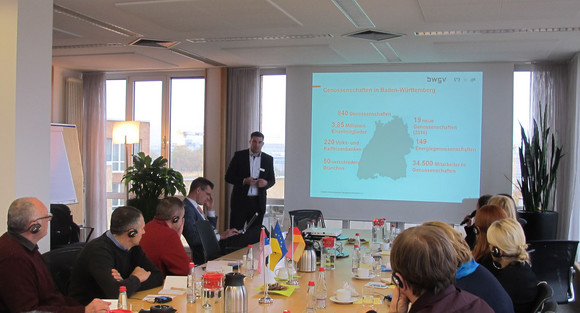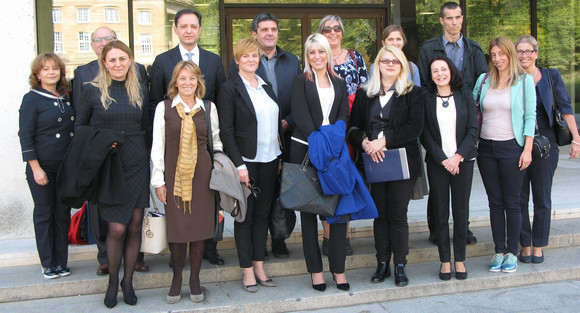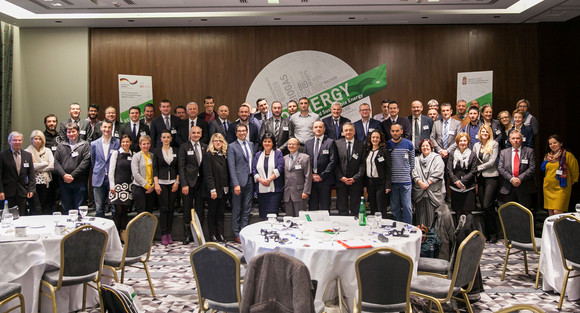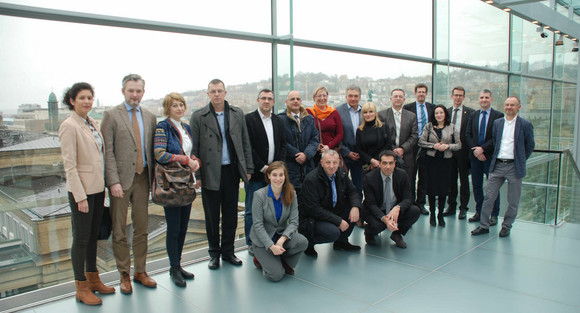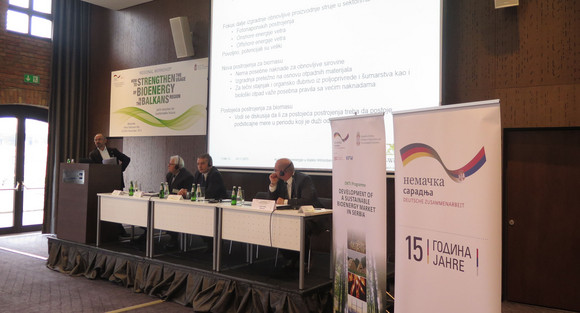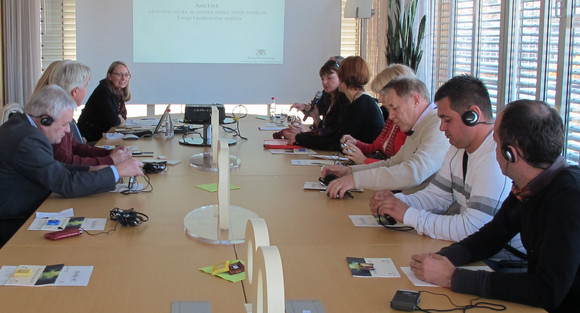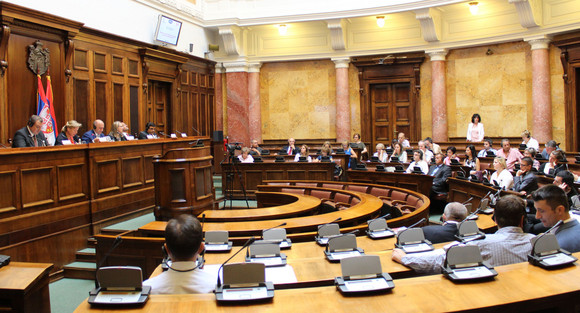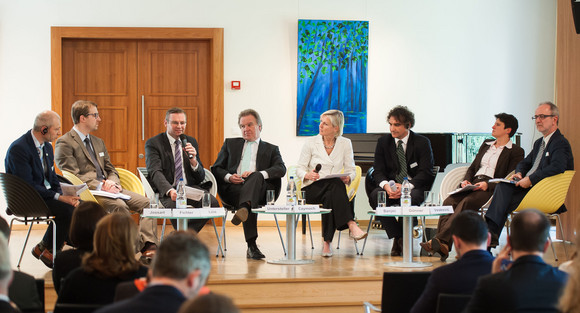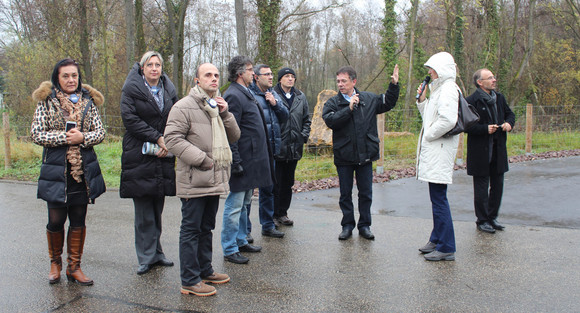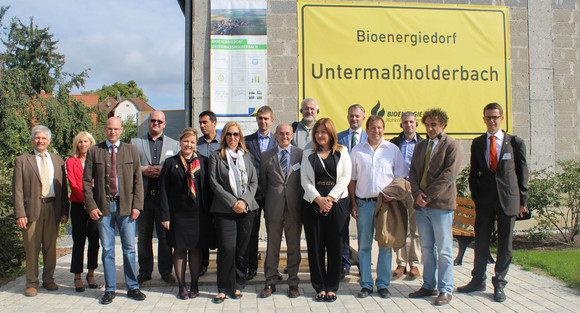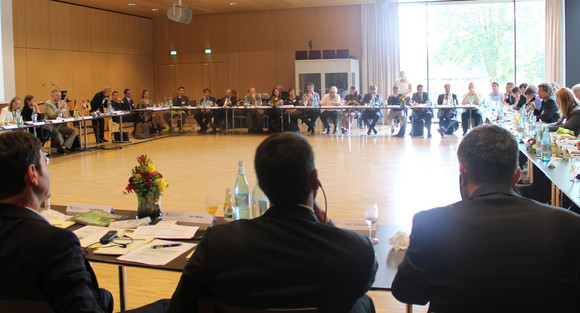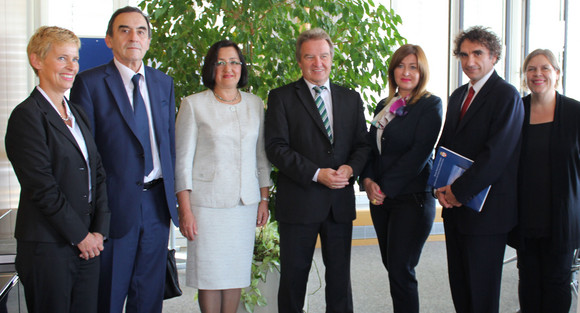The bioenergy partnership between Serbia and Baden-Württemberg, launched in 2014 as part of the EU Danube Region Strategy, is the platform and motor of intensive exchange. Events with different formats are organized. These include workshops, conferences and delegation trips:
The opening event for the bio energy partnership between Baden-Württemberg and Serbia took place in Stuttgart on 9 September 2014. Headed by the Serbian Minister for Agriculture and the Environment, Prof. Dr. Snežana Bogosavljević-Bošković, a high-ranking Serbian delegation was in attendance. The event’s objective was to bring together players from business, research, and politics and to provide momentum for potential collaborations. Furthermore, the participants discussed legal regulations for bio energy and initiated cooperation at the international level. Specific projects are to be developed.
With approx. 70 participants from Serbia, Baden-Württemberg, and other parts of Germany, the opening event was received very well. The Serbian and German partners used this opportunity for exchange. In addition, the partner dialogue gave all participants the opportunity of having further conversations on the structures and forms of partnership, asking questions, and presenting ideas. The opening event was an important big step for collaboration between Baden-Württemberg and Serbia in the area of bio energy.
Following the event, the Serbian delegation had the opportunity of viewing the bio energy village Untermaßholderbach near Öhringen and the Ludwigsburg wood-fired combined heat and power plant. Ravensburg’s Energy Agency was presented to the participants.
In December 2014, at the invitation of the Ministry for the Environment, Climate and Energy, a Serbian delegation visited the bioenergy villages of St. Peter and Büsingen. On the agenda were also presentations and discussions at the Freiburg energy agency. The aim of the delegation’s trip was to find out which approaches from Baden Wurttemberg could be applicable in Serbia or prompt ideas for new solutions there.
In cooperation with the GIZ, delegations travelled to Baden-Württemberg on 28 October 2015 and 5 November 2015. Visits were made to bioenergy villages and small biogas plants.
Another highlight of the bioenergy partnership was Parliamentary Afternoon: “The role of bioenergy in energy security and climate protection in the Danube region – a contribution from Baden Wurttemberg and Serbia”. It took place on April 23, 2015 at the Representation of the State of Baden-Württemberg to the European Union in Brussels. The event was jointly hosted by the Ministry for the Environment, Climate and Energy, GIZ and ARGE Danube.
Downloads
"Use of biomass in the generation of energy – experiences in Baden-Württemberg and Serbia"
Experts from Baden-Württemberg took part in a round table discussion in the Serbian Parliament on 16 September 2015 at the invitation of the Parliamentary Forum for Energy Policy in Serbia. During the discussion they reported on their experiences with biomass. The meeting was led by the Forum's deputy chairperson Dr. Branislav Blažić.
In her speech, Ms Jutta Lück, Head of Department of Baden-Württemberg's Ministry of the Environment, Climate Protection and the Energy Sector, emphasised Baden-Württemberg's desire to continue the political dialogue in the framework of the Baden-Württemberg-Serbia Bioenergy Partnership, to share experiences and to support Serbia on its way to making greater use of renewable energies. The centrepiece of the event were talks given by Mr Konrad Raab from Baden-Württemberg and Professor Ratko Ristić from the University of Belgrade.
The discussion revealed huge interest in the use of bioenergies in Serbia. There is great potential for biomass in Serbia. Not only could it provide the country with a secure and independent source of energy and contribute to climate change mitigation, biomass would also offer important economic benefits and rural development.
From 1 March to 4 March 2016, the Ministry of the Environment hosted a Serbian delegation in the context of the EU's Danube Strategy for a workshop on "Bioenergy" in Stuttgart. The workshop focused on the legal and political conditions for bioenergy, district heating, local heating and financial mechanisms and incentives for renewable energy sources.
Talks held by Konrad Raab (Baden-Württemberg Ministry of the Environment) and Hemut Lamp (National Biomass Association BBE) on the political and legal conditions for bioenergy in Baden-Württemberg formed the basis of an exciting and animated discussion among participants. Presentations by Dr. Volker Kienzlen (KEA Climate and Energy Agency), Kerstin Stolzenburg (Agricultural Technology Center Augustenberg), Karl Zepf (Fernwärme Ulm GmbH) and Nico Storz (Energieagentur Freiburg) provided further expertise on the requirements and implementation of a secure bioenergy supply. Director General Helmfried Meinel took part in the constructive exchange between Baden-Württemberg and Serbia during lunch.
The group excursion to Hemmingen and Waibstadt-Daisbach was another highlight of the workshop. The delegation was able to visit a bioenergy village there and learn about the expansion of a district heating network in practice. In addition, the delegation viewed a miscanthus farm and was briefed on the advantages and disadvantages of miscanthus as a sustainable energy source.
State Secretary Dr. Andre Baumann took part at the GIZ Regional Conference „Bioenergy – Access to Affordable and Sustainable Energy” at 18 November 2016 in Belgrade. The conference generated great interest in the Danube Region: Among the participants were many politicians and leaders from Serbia, Croatia, Montenegro, Bosnia and Herzegovina, Albania, Macedonia and Baden-Württemberg. The aim of the conference was to intensify the international and regional cooperation in the field of bioenergy and - originating from Serbia - to create favorable framework conditions in the regions of South East Europe. This involves laws, support programs and further measures, which could make the use of bioenergy for investors and consumers also economically interesting. The participants shared and discussed the possibilities of affordable, sustainable and modern energy for all consumers. The use of bioenergy could bring a positive economical development to the whole region. Furthermore technical aspects of bioenergy and innovative solutions, which were initiated and implemented the Danube Region, were discussed.
In September 2017, a Serbian delegation of parliamentarians and representatives of non-governmental organizations, led by Dr. Aleksandra Tomic, visited Baden-Württemberg. The President of the Parliament of Baden-Württemberg, Ms. Muhterem Aras, had invited the delegation as part of the bioenergy partnership with Serbia. The guests attended a session of the state parliament and held talks with representatives of the parliamentary committees for Europe and International Affairs as well as for Environment, Climate and the Energy Sector.
Under the leadership of the Ministry of the Environment, Climate Protection and the Energy Sector Baden-Württemberg the Serbian guests visited the Bioenergiedorf Pfalzgrafenweiler. In addition, the Mayor of the municipality of Hemmingen, Mr. Thomas Schäfer presented the bioenergy village Hemmingen. Ministerial Director Helmfried Meinel hosted the event. The delegation visit was prepared and carried out in cooperation with GIZ Gesellschaft für Internationale Zusammenarbeit GmbH.
On the study trip "Energy Cooperatives" in November 2017, our Serbian partners became acquainted with the successful energy cooperatives in Baden-Württemberg and the legal framework. They exchanged experiences with representatives of various energy cooperatives.
The delegation was welcomed in the Ministry of the Environment, Climate Protection and the Energy Sector, where the Cooperative Association Baden-Württemberg and the Baden-Württemberg Ministry of Rural Affairs and Consumer Protection gave lectures about Energy Cooperatives and waste heat recovery . Then the delegation visited the Bioenergiedorf Pfalzgrafenweiler, the energy cooperative Gussenstadt eG and the bio-energy supplier Agro Energy Hohenlohe GmbH & Co. KG.
The participants of the study trip are members of the Agricultural Cooperative, representatives of the municipalities, the Serbian Ministry of Energy and the Serbian Ministry of Environment and Agriculture. The trip was organized by GIZ (Gesellschaft für Internationale Zusammenarbeit GmbH) in cooperation with the Ministry of Environment, Climate Protection and the Energy Sector.

